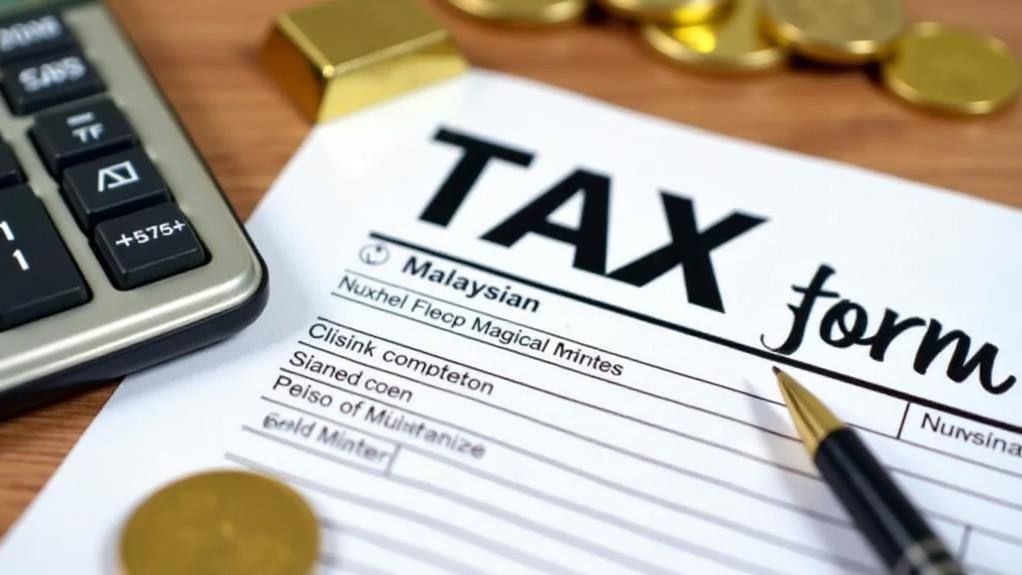Navigating the tax landscape for gold investments in Malaysia can be intricate, yet it is vital for optimizing returns and legal compliance. Although capital gains tax does not typically apply to physical gold sales, investors must consider other financial obligations such as import duties and the distinct tax ramifications for gold ETFs and mining stocks. Proper income reporting and adherence to tax regulations are critical to avoid potential penalties. Strategic tax planning, including leveraging potential exemptions, can significantly impact the profitability of gold investments. The intricacies of these tax considerations warrant a closer examination to fully understand their implications.
Key Insights
- Malaysia does not typically impose capital gains tax on the sale of physical gold.
- Gold ETFs in Malaysia are taxed similarly to unit trusts and subject to income tax.
- Import duties on physical gold vary based on type and weight, affecting overall costs.
- Accurate reporting of gold investment income, including GST, is mandatory for compliance.
- Profits from gold mining stocks may be subject to capital gains tax under the Income Tax Act 1967.
Types of Gold Investments

Gold investments in Malaysia come in several distinct forms, each catering to different investor preferences and risk appetites.
Physical gold options include gold bullion, gold bars, and gold coins, appealing to those who prefer tangible assets. Gold jewellery is likewise a popular choice among retail investors.
For those seeking more liquid investments, gold ETFs and gold futures offer ease of trading on financial markets. Digital gold and gold investment accounts provide convenient, modern alternatives to traditional methods.
Moreover, gold mining stocks offer indirect exposure to gold prices by investing in companies involved in gold extraction and production.
Each type of investment carries its own risk and reward profile, making it essential for investors to carefully consider their options.
Tax on Physical Gold
When investing in physical gold in Malaysia, it is essential to understand the implications of import duty regulations and capital gains tax.
Import duties can significantly affect the overall cost of acquiring gold, impacting the investment's profitability.
Furthermore, while Malaysia does not typically impose a capital gains tax on the sale of gold, investors should remain aware of any regulatory changes that could influence their returns.
Import Duty Regulations
Navigating the intricacies of import duty regulations is vital for investors pondering physical gold in Malaysia.
When reflecting on gold investment, understanding the tax on gold, specifically gold bullion, gold coins, and gold bars, is fundamental. Malaysia imposes customs duty on gold imports, which can significantly impact the overall investment cost.
Import duty regulations specify specific rates and conditions that vary based on the type and weight of the gold. Notably, some tax exemptions may apply under certain circumstances, particularly for investment-grade bullion.
Nevertheless, failing to comply with import regulations can result in penalties. Therefore, thorough knowledge of these rules is imperative for optimizing returns and ensuring compliance in gold investment endeavors in Malaysia.
Capital Gains Tax
Understanding the implications of Capital Gains Tax (CGT) on physical gold investments is essential for any investor seeking to maximize their returns in Malaysia. The tax treatment of gold bullion, coins, and bars varies, but generally, capital gains from these forms are subject to CGT. Taxation on gold ETFs and futures likewise follows specific guidelines, impacting the overall tax on gold investment profits. Investors must be aware of their tax liability on gold transactions to avoid unexpected costs. While some capital gains tax exemptions for gold exist, they are limited. Below is a summary of the tax treatments:
| Gold Type | Tax Treatment |
|---|---|
| Gold Bullion | Subject to CGT |
| Gold Coins | Subject to CGT |
| Gold Bars | Subject to CGT |
| Gold ETFs/Futures | Specific taxation rules |
Gold ETFs and Taxation

Investing in Gold Exchange-Traded Funds (ETFs) in Malaysia presents a unique opportunity for investors to immerse themselves in their portfolios while benefiting from the potential appreciation of gold prices.
In Malaysia, gold ETFs are treated in a comparable manner to unit trusts for taxation purposes. Consequently, investment returns from gold ETFs are subject to income tax rather than capital gains tax.
Investors must ensure accurate tax reporting to comply with Malaysian regulations. As of 2024, there are no specific tax exemptions for gains derived from gold ETFs, making it essential to understand the tax implications fully.
Seeking professional advice can help guide through the intricacies of taxation in Malaysia, ensuring compliance and optimizing investment returns.
Tax Implications of Gold Stocks
When pondering the tax implications of gold stocks in Malaysia, it is vital to recognize the distinct differences from other forms of gold investments.
Taxation of gold mining stocks falls under Malaysia's tax laws, particularly the Income Tax Act 1967. Investors must consider capital gains tax on gold investment returns, as profits from selling gold stocks may be taxable.
Additionally, the tax deductibility of gold investment expenses can influence overall profitability. Bursa Malaysia offers various gold market investment opportunities, each with specific tax reporting requirements for gold investments.
Understanding these nuances ensures compliance and maximizes returns. Awareness of Malaysia's tax laws is critical for anyone engaging in gold investments, facilitating informed financial decisions.
Reporting Gold Investment Income

While understanding the tax implications of gold stocks is important, equally significant is the accurate reporting of gold investment income in Malaysia.
Investors must account for taxes such as the goods and services tax (GST) and capital gains tax (CGT) on their gold investment returns. The Malaysian government requires that gold savings, gold ETFs, and other gold-related investments be reported accurately.
Exemptions on gold investment taxes may apply in certain scenarios, but it is essential to be aware of the potential income tax liabilities. Accurate reporting income ensures compliance with regulations and avoids legal complications.
Investors should keep detailed records of all transactions to facilitate proper reporting of gold investment income for tax purposes.
Tax Planning Tips
Effective tax planning is fundamental for optimizing gold investment returns in Malaysia.
Understanding the tax implications for gold investment funds is significant. For example, while capital gains tax is generally not applicable, goods and services tax may affect transactions. Sovereign gold bonds offer potential exemptions, which can be advantageous.
Monitoring the gold price and assessing taxation on gold investment returns is vital. According to a managing director, strategic decisions, like choosing between physical gold and gold investment funds, can impact gold investment and income tax.
To invest in gold wisely, consider the taxation framework and its effect on net returns. Careful analysis ensures compliance and maximizes benefits from gold investments.
My Final Thoughts
In summary, understanding the tax implications on gold investments in Malaysia is essential for investors aiming to maximize returns and ensure regulatory compliance. While capital gains tax on physical gold is generally absent, attention must be given to import duties and specific taxes on gold ETFs and mining stocks. Accurate income reporting and strategic tax planning are vital. As the saying goes, "Forewarned is forearmed," and staying informed can significantly improve the profitability of gold investments in Malaysia.







